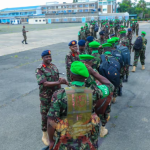A coalition of human rights organizations has denounced Kenya’s decision to deport four Turkish nationals back to Turkey. The group, known as the Police Reforms Working Group, expressed shock at Kenya’s acknowledgment that its law enforcement and foreign affairs agencies facilitated the return of Mustafa Genç, Oztürk Uzun, Alparslan Tasçi, and Hüseyin Yesilsu.
In a statement, the group emphasized that the principle of non-refoulement is essential to refugee protection, a tenet recognized in international humanitarian law for over seventy years. They highlighted that this principle prohibits returning refugees to places where they face the dangers they fled.
The organizations argued that obligations under international law cannot be compromised for commercial, diplomatic, or trade interests, as such actions would violate both national and international law. They pointed out that international refugee law allows for the return of refugees only if they pose a national security threat or have been convicted of a crime that endangers others, and even then, procedural safeguards must be in place.
The statement further criticized Kenya for potentially placing these individuals at grave risk, undermining its reputation as a sanctuary for those fleeing persecution and conflict. The organizations stressed that this action damages Kenya’s credibility as a recent member of the United Nations Human Rights Council and jeopardizes the upcoming United Nations Universal Periodic Review process.
“This breach undermines Kenya’s legal commitments and its international moral standing,” the group stated, highlighting the threat it poses to three decades of trust in Kenya’s humanitarian protection for the approximately 780,000 refugees currently in the country.
Kenya’s State Department of Foreign Affairs confirmed that the four Turkish nationals, captured on October 18, were repatriated at the request of the Turkish government. Principal Secretary Korir Sing’Oei assured that the rights of the four individuals would be upheld following assurances from Turkish authorities.
“The Ministry of Foreign and Diaspora Affairs has received assurances from the Turkish authorities that the four will be treated with dignity in keeping with national and international law,” he said.
Kenya is committed to the privacy and confidentiality of the repatriated individuals and will refrain from responding to media inquiries on the subject until the ongoing inter-agency review of the case is complete.” Kenya acceded to this request on the strength of the robust historical and strategic relations anchored on bilateral instruments between our respective countries.”
He also expressed the government’s commitment to the international community to protect and promote refugee rights as prescribed under national and international law.
“Kenya is committed to the privacy and confidentiality of the repatriated individuals and will refrain from responding to media inquiries on the subject until the ongoing inter-agency inquiry review of the case is complete,” he said.
“As such, the rights welfare and well-being of the more than 780,000 refugees residing in the country will remain the government’s singular priority.”
A total of seven Turkish citizens were Friday abducted by unknown people in Kileleshwa, Nairobi.
Three of them were however later released by the said abductors.
The incident happened in the Kileleshwa area while the foreigners were driving to their office in the morning hours.
They are teachers in Nairobi.
Mustafa Genç, his son Abdullah Genç, Hüseyin Yeşilsu, Necdet Seyitoğlu, Öztürk Uzun, Alparslan Taşçı and his wife Saadet Taşçı were the individuals that were kidnapped. Abdullah Genç, Necdet Seyitoğlu and Saadet Taşçı were later released by the kidnappers.
Necdet Seyitoglu who is an education consultant in Nairobi said after being abducted, they were taken around for at least eight hours.
He said the car that blocked them was a white Jeep while they were in an office van. Their vehicle was intercepted by men in balaclavas and were bundled into vehicles to unknown destinations.
“After the ordeal, I was dumped in an unknown location and one of the gunmen gave me Sh1,000 and ordered me to board a matatu as they proceeded with my colleagues,” Seyitoglu added.
The four were asylum-seekers registered with the Office of the United Nations High Commissioner for Refugees (UNHCR).



